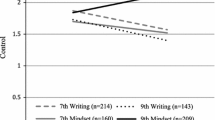Abstract
The efficacy of an REBT-based skill training program on the mathematics performance of disadvantaged black eleventh graders enrolled in Upward Bound was examined. Fifty-six students (18 males and 37 females) were randomly assigned to Perception Analysis Training (PAT) or an attention control group (ACG). The two groups met at the same hour each week for eight-weeks. PAT consisted of instruction in the application of RET strategies to the management of emotions that interfere with the development of proficiency in mathematics. ACG group members discussed films pertaining to career and personal development. Pre-test results confirmed a relationship between beliefs and mathematics achievement. Three measures of problematic beliefs concerning mathematics were significantly correlated (p>.01) with high school math grades and performance on the California Achievement Test-Math (CAT). At post-test PAT participants were less committed to self-defeating beliefs regarding mathematics than AGC members. ANCOVAs showed that PAT students made significantly greater pre- to post-test gains in their mathematical performance than control group members. PAT group members out performed AGC subjects in terms of Upward Bound math grades (ES=0.61; p >.0008), high school math grades (ES = 1.09; p>.0001), and scores on the CAT (ES=0.40; p >.02).
Similar content being viewed by others
REFERENCES
Allen, T.W. (1969). College achievement and the willingness to accept limitations. Journal of Individual Psychology, 25, 52-55.
Allen, T.W. (1971). The individual psychology of Alfred Adler: an item of history and a promise of a revolution. The Counseling Psychologist, 3(1), 3-24.
Allen, T.W. (1988). The cognitive bases of peak performance: a classroom intervention. Journal of Counseling and Development, 67, 202-204.
Bosley, F. & Allen, T.W. (1988). Stress management training for hypertensives: Psychological and physiological effects. Journal of Behavioral Medicine, 12, 77-91.
Dreikurs, Rudolf (1968) Psychology in the Classroom. New York: Harper & Row.
Dutton, W. & Blum, M. (1968). The measurement of attitudes toward arithmetic with a Likert-type test. Elementary School Journal.
Ellis, A. & Bernard, M. (1985). Clinical Applications of Rational-Emotive Therapy. New York: Plenum.
Fennema, E. & Sherman, J. (1976). Sex related difference in mathematics achievement, spatial visualization and sociocultural factors. Report to the National Science Foundation.
Knaus, W. (1974). Rational-emotive education: a manual for elementary school teachers. New York: Institute for Rational Living.
Knaus, W. & McKeever, C. (1977). Rational-emotive education with learning disabled children. Journal of Learning Disabilities, 10(1), 10-14.
Little, B. L. (1985). Emotions, stress, quality of life and the response of cancer patients to treatment. Unpublished doctoral dissertation. St. Louis, MO: Washington University.
Knaus, W. (1977). Rational-emotive education. In A. Ellis & R. Grieger (eds.) Handbook of Rational-emotive Therapy. New York: Springer. Pp. 398-408.
Paulos, J.A. (1988). Innumeracy: mathematical illiteracy and its consequences. New York: Hill and Wang.
Ryan, Allison M & Pintrich, P.R. (1997). “Should I Ask for Help?” The role of motivation and attitudes in adolescents' help seeking in math class. Journal of Educational Psychology, 89, 329-341.
Shannon, H. (1982). A study of the effectiveness of perception analysis training on the mathematics attitudes and achievement of disadvantaged black students. Unpublished doctoral dissertation. St. Louis, MO: Washington University.
Tamaren, A. J., Carney, R. M. & Allen, T.W. (1985). Predictive validity of the cognitive vs. somatic anxiety distinction. Pavlovian Journal of Biological Science, 20, 177-180.
Sheila Tobias (1991). Math mental health: going beyond math anxiety. College Teaching. 18: pp. 91-93.
Trentacosta, J. & Kenney, M.J. (eds.) (1997). Multicultural and gender equity in the mathematics classroom: the gift of diversity. Reston, VA: National Council of Teachers of Mathematics.
Author information
Authors and Affiliations
Rights and permissions
About this article
Cite this article
Shannon, H.D., Allen, T.W. The Effectiveness of a REBT Training Program in Increasing the Performance of High School Students in Mathematics. Journal of Rational-Emotive & Cognitive-Behavior Therapy 16, 197–209 (1998). https://doi.org/10.1023/A:1024963131417
Issue Date:
DOI: https://doi.org/10.1023/A:1024963131417




